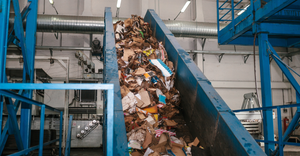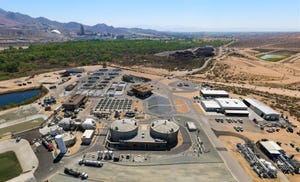New Hampshire’s Largest City to Pilot Automated Solid Waste Collection
The pilot program will include one automated truck collecting along a specific route in specific wards in New Hampshire’s largest city.
The Department of Public Works in Manchester, N.H., has been eyeing automated collection for specific routes in the city for some time, but convincing the powers that be to change the city’s fleet is no easy task.
After approaching the city’s Board of Mayor and Aldermen on several occasions to make the decision to automate, the department worked with the board and came to a compromise: a pilot automated solid waste program.
The pilot program, recently approved by the board, will include one automated truck collecting along a specific route in specific wards in New Hampshire’s largest city.
“We’re convinced it will work well,” says Department of Public Works Director Kevin Sheppard. “It works well in other towns and cities here in New Hampshire, as well as other states.”
To get the Board of Mayor and Aldermen more comfortable with an automated collection program, the department will do a six- to 12-month trial with the automated truck starting in spring 2017, he says. The department has targeted five routes in the city that could be well suited for automated collection, but as the board was not ready to take such a leap, the pilot program will help the aldermen determine how well it works.
While there are plenty of reasons to consider automating residential solid waste collection, Sheppard says, worker safety is among the biggest concern.
According to the U.S. Labor Department’s Bureau of Labor Statistics, waste collection is the fifth most dangerous industry. The fatal injury rate for U.S. waste collection employees is 33 per 100,000. Lifts and falls also contribute to missed work for employees.
In Manchester, the department estimates it lost an average of 4,500 hours per year over the last three fiscal years to injuries and paid hundreds of thousands of dollars in workers compensation to solid waste employees injured on the job. The city currently has anywhere from two to three men working at a time on rear-load trucks.
“One of the big reasons we did try to it move forward is because we believe it is a much safer way of collecting trash,” says Sheppard.
In addition to worker safety, the department hopes the pilot program will show improvement in the cleanliness of neighborhoods, as residents will no longer be putting trash on the ground at the curb, but instead will use the lidded carts compatible with automated trucks.
As part of the trial, residents and the city will split the cost of bins. The city already has been offering residents trash carts compatible with an automated system, and those residents who’ve acquired carts from the city will continue to use those carts. Those in the trial who do not have a cart will have the opportunity to split the cost with the city. DPW staff estimates that the customer’s cost share will be between $25 and $35 per cart, including delivery.
“Obviously we feel it’s a more efficient way of collecting solid waste,” says Sheppard.
Automation, he says, also will achieve efficiency gains and lead to better service for Manchester residents.
Many pieces must be put in place before the pilot program begins, including acquisition of equipment, distribution of trash carts, public outreach and personnel training.
“We’re looking forward to the pilot program,” says Sheppard. “We’re glad that at least a pilot program was approved. We’re confident that it will be successful, but ultimately it is up to the Board of Mayor and Alderman whether we’re going to expand the program.”
About the Author
You May Also Like


